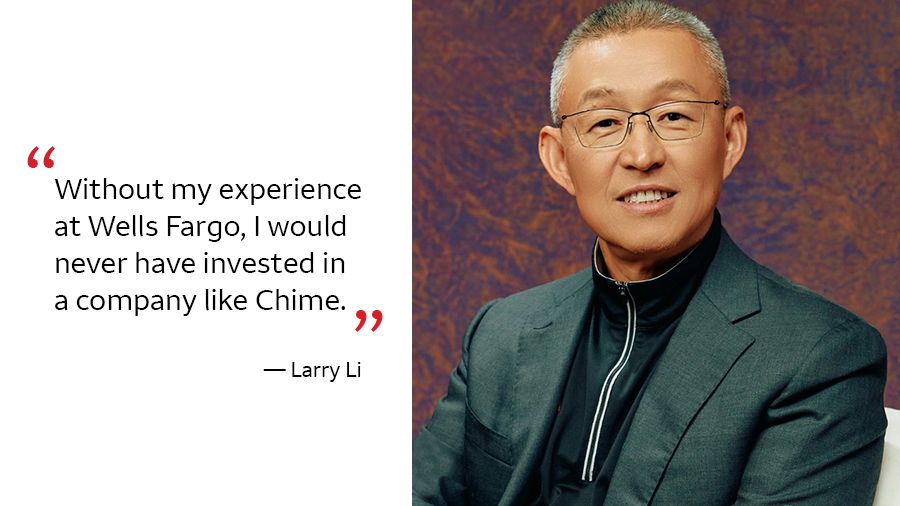Ask Larry Li how he became a founder and managing partner of Amino Capital, and he cites luck, circumstances, and good fortune. But that's Just Modesty talking.
Your company doesn’t end up on Forbes’ Top 5 AI Investment Trendsetter and 2024 Midas Seed Lists, and you don’t cofound a technology company without intelligent direction, skillful execution, and the vision to see obstacles as opportunities. Li, who joined Wells Fargo (then Wachovia) in 1997, spent the first years of his career amassing general expertise and knowledge around all kinds of software and hardware systems. “I didn’t know the breadth of challenges financial institutions were facing at the time,” Li said. “Data security, inefficiencies — there were a lot of issues, and there wasn’t a good, obvious solution at the time.”
Though his time with Wells Fargo was relatively short, Li kept those learnings in the back of his mind over the next decade, as he worked in roles varying from engineering manager for Symantec to technical director and chief architect for Lockerz. “I saw so many good solutions to a lot of problems,” explained Li. “I wanted to work on all of them, but that just wasn’t possible.” So, in 2010, Li and a few friends thought it’d be smart to invest in some of those good ideas. They got started as one of the first investors to write a check to a company specializing in videotelephony software named Zoom.
Two years later, they founded Amino Capital, a venture capital firm based in Palo Alto, California. “I love meeting new people and exchanging ideas,” said Li. “But at that stage of my life, investing was better than starting a company where you’re competing with 20-year-olds who are working 20-hour days, every day.”
Among the signature wins for Amino was being the first company to invest in Chime – a fintech startup – in 2013. It’s now the largest digital bank in the United States. “Without my experience at Wells Fargo, I would never have invested in a company like Chime,” Li said. “They tried to solve inefficiencies by providing customers with more information, while still giving the same offerings as branches.”
Today, under Li’s leadership, Amino invests in technology companies in 30 states, and has a portfolio of startups in Europe, Africa, and Asia. Of the more than 300 companies it’s invested in, 17 have become unicorns (companies with a valuation of $1 billion or more). Li attributes a high percentage of his company’s success to a factor he feels many overlook. “Most unicorn founders are outliers, but have two things we look for,” said Li. “They have to be energetic, and they usually come from a diverse background.”
A love for new ideas and new people led to another unexpected turn in Li’s career. He published his first book, VC, Demystified: Strategy and Practice, earlier this year. The impetus for the book was to provide a clear view of the world of venture capital (VC). “VC is pretty opaque,” said Li. “If you’re not in it, it’s very hard to know what’s going on inside. The majority of the people in it either have a lot of money or went to one of the top Ivy league schools and have all the resources. I wrote this book to show that anyone, like myself, can enter this world and be successful. I want to democratize the VC industry.
And, opening up VC to a new group of people, will likely prove fruitful for the industry. “Diversity is important,” said Li. “We found that people with complementary backgrounds and skillsets have a much better chance to be successful. The typical team that is successful looks very different... the more mix of ideas, beliefs, and backgrounds the better. Of the 300 companies we invested in, 17 became unicorns, and most of their founders had backgrounds that made them outliers from traditional VC founders.”
When he’s not helping create the next generation of fintech companies, Li swims or plays golf daily. With his offices just miles from Stanford University, Li is a regular on campus, offering himself as a mentor to aspiring investors and ordinary students.
On October 19, he’ll be formally inducted into the Asian Hall of Fame during a ceremony in Los Angeles. Founded in 2004, the Asian Hall of Fame educates the public about Asian contributions to the United States and the world. Inductees, according to the Hall of Fame, are “a pillar of community, titan of finance, or trailblazer of industry” who have “elevated commerce, culture, and collaboration with humility that derives from transforming adversity into triumph for the positive advancement of a better civilization.”
“It’s truly an honor and inspiring,” said Li of his pending induction. “I never thought I could do this… it’s a surprise to me to be introduced into this particular group of people. It will give me a chance to learn from those people, from very diverse backgrounds. I’m looking forward to a good platform to exchange ideas and resources.”


